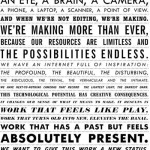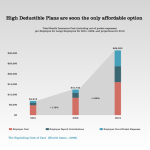Call it relationship inflation. Nominally, you have a lot more relationships — but in reality, few, if any, are actually valuable. Just as currency inflation debases money, so social inflation debases relationships. The very word “relationship” is being cheapened. It used to mean someone you could count on. Today, it means someone you can swap bits with. Thin relationships are the illusion of real relationships. Real relationships are patterns of mutual investment. I invest in you, you invest in me. Parents, kids, spouses — all are multiple digit investments, of time, money, knowledge, and attention. The “relationships” at the heart of the social bubble aren’t real because they’re not marked by mutual investment . At most, they’re marked by a tiny chunk of information or attention here or there.
Uncategorized
Every company has a social media strategy
Every company has a social media strategy
“Every company has a social media strategy whether they know it or not. You can have your dedicated social media person chasing down consumer complaints, but your real social media strategy is how are the people who work at your company and the people who buy from your company and people who supply to your company, how are they talking about you in social media? The way to make them talk about you [favorably] is by walking the walk of the thing that you do.”
—
We now know…
“We now know enough to know that we will never know everything. This is why we need art: it teaches us how to live with mystery. Only the artist can explore the ineffable without offering us an answer, for sometimes there is no answer. John Keats called this romantic impulse ‘negative capability.’ He said that certain poets, like Shakespeare, had ‘the ability to remain in uncertainties, mysteries, doubts, without any irritable reaching after fact and reason.’ Keats realized that just because something can’t be solved, or reduced into the laws of physics, doesn’t mean it isn’t real. When we venture beyond the edge of our knowledge, all we have is art.”
—
—Jonah Lehrer
Podcast: Interview with Jordan Weisman, on “Shadowrun Returns” | J.C. Hutchins: New Fiction And Author Updates
Untitled
Untitled
Words to live by…
Untitled
Obama’s plan started with good intentions. But in the end, it ended up being a compromise that essentially puts the medical industry on life support. It’s prolonging the death of a completely unsustainable industry. Let’s look at the average cost of yearly health insurance premiums over time:
2001: $4,918
2009: $10,743
2019: $28, 530
These numbers are an undisputed fact. By the end of the decade, premiums will be, on average, just shy of $30,000. Obamacare does very little to control costs. Remember, almost everything about this Act is a compromise with the incumbents to maintain the status quo as much as possible. And that status quo is unsustainable. Even with Obamacare, the premiums are still going to rise to nearly $30,000 by the end of the decade.
I think now is not the right time to put a dying industry on life support. We need to think long term. And the only long term sustainable solution for the medical industry is a single payor healthcare system. There is simply no way, in a country as large as ours, to link profitability to sickness. And Obamacare, by mandating us as individuals to purchase healthcare from a private industry beholden to it’s shareholders, simply prolongs an unsustainable industry.
I think healthcare reform, and I mean fundamental reform, can only happen when everyone’s feet is held to the fire. And that’s going to happen toward the end of this decade, when individuals and companies en masse, realize they can’t afford even the average premium. And that’s the right time to fundamentally change the entire business model of healthcare in America. When people aren’t under the gun, compromise is the easiest way out. But compromise amongst industry insiders won’t solve the fundamental problems we face trying to take care of the health of our population. Trial by fire is probably the only way.
We need a completely different system— a single payor that profits off wellness, not sickness. We’re simply not going to get that by placing a broken and unsustainable system on life support. If I felt that Obamacare was a good first step toward a sustainable system, I’d support it. But the shit is going to hit the health insurance premium fan in the next 7 years, and I have no faith that more compromises amongst industry insiders will get us toward a sustainable single payor system.
I think the real “success” of our modern American leaders is giving all of us, especially minority groups, just enough rights to shut us up. That’s what’s happening with healthcare too. In seven years, they’ll look out at the population and tout stats that say we’re better off. But, in reality, over the long term, we’re worse off. The leaders deciding my long term health and financial status will be dead and gone when our healthcare system is beyond bankrupt. And their selfish focus on short term compromise instead of long terms gains makes me furious. And for that reason, I’m not a fan of Obamacare and I hope SCOTUS overturns it and lets us have a trial by fire in seven years, hastening a much quicker transition from a medical industry to a single payor, sustainable healthcare system.
1. The audience is fickle.
2. Grab ‘em by the throat and never let ‘em go.
3. Develop a clean line of action for your leading character.
4. Know where you’re going.
5. The more subtle and elegant you are in hiding your plot points, the better you are as a writer.
6. If you have a problem with the third act, the real problem is in the first act.
7. A tip from Lubitsch: Let the audience add up two plus two. They’ll love you forever.
8. In doing voice-overs, be careful not to describe what the audience already sees. Add to what they’re seeing.
9. The event that occurs at the second act curtain triggers the end of the movie.
10. The third act must build, build, build in tempo and action until the last event, and then — that’s it. Don’t hang around.
Advice from legendary filmmaker Billy Wilder, a fine addition to our ongoing collection of advice from cultural icons and modern heroes.
From the excellent Conversations with Wilder.
Untitled
From 2007 – amazing Alternate Reality Game that asks players to come up with scenarios around what happens when oil get’s so expensive we need a planB.
Love this project.
Welcome to a World Without Oil (by WorldWithoutOil)
“I Get Frustrated.”
Actor/comedian Aziz Ansari shares my Games of Thrones pain. As he tells GQ:
The way people release media is so far behind the way people actually consume it. There’s so much frustration. I mean, I get frustrated. I want to watch Game of Thrones. I’d love to see it before it comes back. Is it on iTunes? Do I watch it on HBO On Demand? What’s going on? What do I do? I bought the DVD, but I can’t watch it on my iPad?
And:
This is $5, and you have a video file that you can watch anywhere. I think people like the simplicity. Many surveys have people who stream TV shows or steal content saying that if it was available at a fair price and in a convenient form, they wouldn’t steal. And I believe that. Let’s say you hear that show Homeland is great, and you don’t have Showtime. You want to buy it. You go to Amazon, it’s not there. You go to Netflix, it’s not there. OK, fuck it, you’re just going to steal it from a torrent. But if you saw that it was $10, you could get all the episodes and watch it on anything, wouldn’t you do that? If you knew that the quality was proper and everything?
A-fucking-men.
And unlike me, Ansari is in a position to do something about it on his end. He has put his comedy special online Louis C.K.-style.
For $5, you buy it, you own it, you can watch it anywhere. Support sanity.
[thanks Eric]



